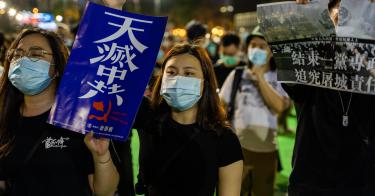The United States ought to care what happens to the people of Hong Kong. How the Chinese Communist Party treats the island is a bellwether for how it will treat the rest of the planet. Right now, the canary looks to be gasping in its cage as darkness closes in.
When sovereignty of the crown colony of Hong Kong was returned to China in 1997, the pomp and circumstance of the ceremony was accompanied by something known as the “Basic Law.” Under it, Beijing agreed to honor the political and economic freedoms of the people of Hong Kong, famously described as “one country, two systems.”
In recent years, however, that’s been changing. The Communist Chinese Party has been eroding the regime’s obligations under the law, exerting more and more influence. Now, the Chinese government is drafting a new national law which will green-light direct intervention, essentially allowing Beijing to directly quash dissidents under the guise of imposing national security. The people of Hong Kong are seeing their freedoms vaporize before their eyes.
If this is how the Chinese Communist Party honors its commitments to its own people, then the rest of us should be truly frightened for how the regime will treat the rest of the world in the future. The contrast between the free world and China could not be starker.
We believe in freely-elected governments, human rights and free enterprise. The Communists do not. Just look at the difference in how we handle demonstrations. In the United States, for example, when we send soldiers into the streets it is to safeguard the right to protest and protect lives and property. The soldiers are there to support civil authorities.
But when soldiers flood the streets of Hong Kong, just like they did in Beijing’s Tiananmen Square in 1989, they are there to punish people who dare to care for freedom.
The U.S. government has been shining a constant spotlight on Chinese abuses—and rightly so. This included the State Department making a determination, as required under American law, that the Chinese government has violated its commitments under the Basic Law. This determination, in turn, requires the government to withdraw certain trade and exports advantages that the United States extends to Hong Kong.
This is absolutely the right step to take. By taking such a strong stand, American and international pressure may press the Chinese government to postpone or water down the proposed national security law. If Beijing does press on, the American effort further highlights who is really responsible for the suffering of the Hong Kong people—the Chinese Communist Party.
Similarly, by withdrawing from the World Health Organization once the WHO refused to implement transparency and accountability reforms after abetting Chinese misdeeds during the COVID outbreak, the administration sent a signal. It showed that it plans through international organizations to do battle with China over its abuses.
Additionally, the administration has said it will sanction Chinese officials for human rights abuses in Hong Kong and elsewhere.
The strategy of keeping the focus on the Chinese Communist Party is the right way forward. The question now is what the United States does to double down.
There are two steps that would help. One, taking steps to get the American economy up and running again. Our economic strength is a key competitive advantage.
Two, America needs to lead the free world in the response to China’s destabilizing behavior. If we don’t stand up, others countries won’t. When they do stand up, we have to work together—rebuilding our economies, strengthening our security and showing China we won’t back down.
This piece originally appeared in The Washington Times




